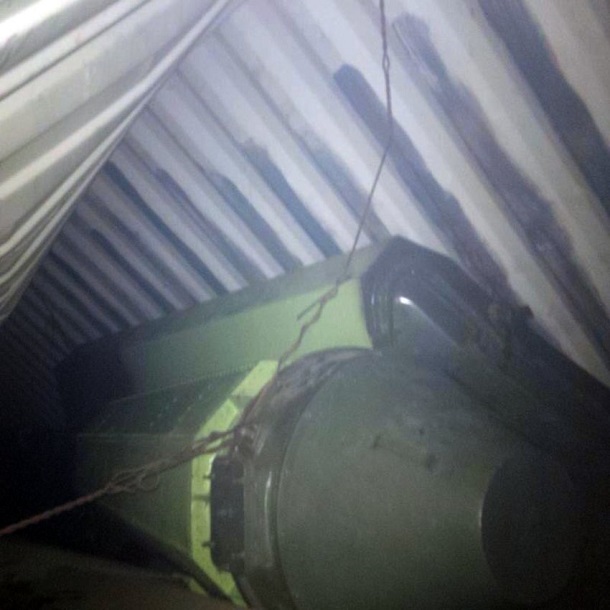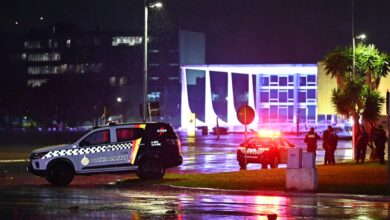Panama has stopped a North Korean ship which it claims was trying to illegally sneak sophisticated missiles through the Panama Canal.
Panamanian authorities boarded the ship suspecting it was carrying drugs.
However, when they searched it they discovered “undeclared weapons of war” among a shipment of brown sugar, according to Panamanian President Ricardo Martinelli.
The North Korean captain attempted to kill himself and violence broke out among the 35-strong crew as the ship was raided, according to Mr Martinelli.
The president posted a photograph of the cargo on his Twitter account and said: “The world needs to sit up and take note: you cannot go around shipping undeclared weapons of war through the Panama Canal.”
He told Radio Panama: “We had suspected this ship, which was coming from Cuba and headed to North Korea, might have drugs aboard so it was brought into port for search and inspection.
“When we started to unload the shipment of sugar we located containers that we believe to be sophisticated missile equipment, and that is not allowed.”
The ship, called the Chong Chon Gang, is currently being held by the Panamanian authorities.
Hugh Griffiths, an arms trafficking expert at the Stockholm International Peace Research Institute, said the seized ship is called Chong Chon Gang and has been on the institute’s suspect list for some time.
He said the ship had been caught before for trafficking narcotics and small arms ammunition. It was stopped in 2010 in the Ukraine and was attacked by pirates 400 miles off the coast of Somalia in 2009.
Mr Griffiths’ institute has also been interested in the ship because of a stop it made in 2009 in Tartus – a Syrian port city hosting a Russian naval base.
North Korea has yet to respond to the incident, however, previously the government in Pyongyang has branded such seizures as a ‘double standard’.
North Korea believes it has the right to ship weapons in the same way that most other countries do on a regular basis.
A source familiar with North Korea’s defence capability told Sky News he believed the photo showed an anti-ship missile.
North Korea and Cuba are ideologically allied as communist nations and both are seen as politically isolated from the rest of the world. However, arms shipments between the two countries are rare.
“Cuba is often cited alongside the DPRK as the two last hard-line communist holdouts, yet this is misleading in several ways.” Korean analyst Aidan Foster-Carter told Sky News.
“On the external economic front, it is the US – and only the US – that applies closure to Cuba more than vice versa. Internally, Cuba is finally grasping the nettle of market reforms with a will, rigour, and honesty still wholly missing in North Korea.”
North Korea is banned, under several United Nations resolutions, from importing and exporting all weapons, with the exception of small arms.
The UN has said the ban will remain in place until Pyongyang shuts down its nuclear weapons programme.
However, there is no suggestion that the weapons seized in Panama have any nuclear capability.
North Korea defiantly carried out its third nuclear weapons test in February and threatened to attack the United States in the most aggressive act yet by the leader Kim Jong-Un.
It led to banking sanctions being imposed by Washington on Pyongyang.
UN resolution 1718, ratified in 2006 bans North Korea from importing and exporting all weapons with the exception of small arms. The resolution was reaffirmed by the Security Council in March 2013 following North Korea’s latest nuclear test and rocket launch.
Following the 2006 resolution, the North Korean ambassador to the UN branded the ban a “double standard”.
Pak Gil Yon told the Security Council: “It [is] ‘gangster-like’ for the Security Council to adopt such a coercive resolution against the Democratic People’s Republic of Korea, while neglecting the nuclear threat posed by the United States against his country. It was a clear testament that the Council had completely lost its impartiality and was persisting in applying double standards to its work.”
[adrotate banner=”62″]
 Netanyahu’s Residence Targeted in Another Attack
Netanyahu’s Residence Targeted in Another Attack Russia Halts Gas Supplies to Austria, Marking a Shift in European Energy Relations
Russia Halts Gas Supplies to Austria, Marking a Shift in European Energy Relations Apparently a suicide attack in Brasilia
Apparently a suicide attack in Brasilia Investigations against Martin Sellner
Investigations against Martin Sellner